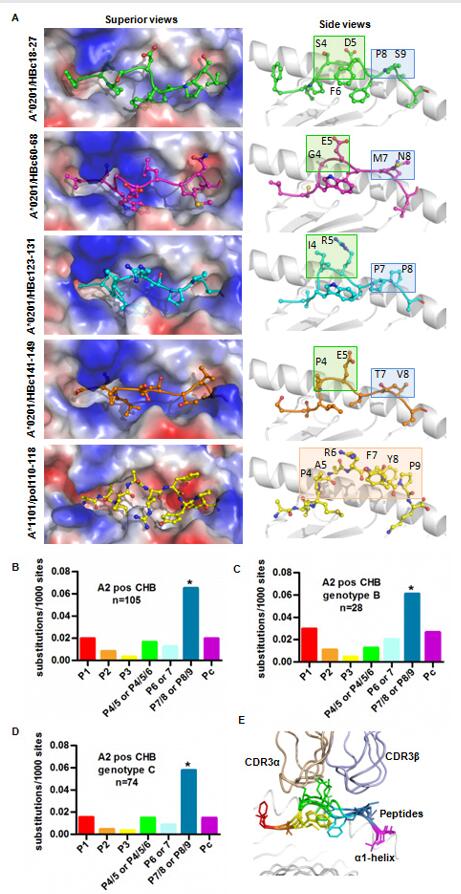T cell-driven evolution of hepatitis B virus discovered by microorganisms August 29, 2018 Source: Institute of Microbiology, Chinese Academy of Sciences About 72 million people in China are chronically infected with hepatitis B virus. Chronic hepatitis B infection causes liver cirrhosis, liver failure and liver cancer, which seriously endangers people's health. Hepatitis B virus-specific T cell immunity plays a central role in clearing viral infections and affecting disease progression, while hepatitis B virus evades T cell immune clearance by genetic mutations, leading to chronic infection and immune escape. Therefore, studying the law of viral immune escape is of great significance for the design of new therapeutic vaccines and antiviral drugs. Figure: Structural analysis of HLA-A2-related HBV core epitope variation Meng Yidong, a key laboratory of the Institute of Microbiology and Immunology, Institute of Microbiology, Chinese Academy of Sciences, found that hepatitis B virus core protein mutations are closely related to the progression of chronic hepatitis B disease through clinical sample analysis, further utilizing the function of heat shock protein gp96 antigen presentation and activation of T cells. T cell epitope prediction and immunological function analysis, structural immunology analysis, identified a series of CD8+ T cell epitopes and amino acid variation sites, and found that epitope mutations resulted in significantly reduced T cell antiviral activity compared with wild type epitopes. And positively correlated with clinical indications and disease progression in patients with hepatitis B infection. Further, structural analysis and sequence alignment revealed a highly variable C-terminal bulge of the "M-shaped" viral core epitope presented by the human major histocompatibility complex (HLA-A2), which is recognized by the T cell receptor. The main site (pictured) reveals the molecular mechanism of immune escape of virus under T cell selection pressure, and provides a basis for designing new hepatitis B therapeutic vaccines and drugs with gp96 as adjuvant. The above research results were published in the recent issue of Journal of Virology. The microbiology institutes Zhang Yu and Wu Yan are the co-first authors of the paper. The microbiology institute Meng Yidong and the national CDC Liu Jun are co-communication authors, and several research groups in the pathogen room are involved. Research. The research was funded by the National “973†Project, the Natural Science Foundation Project, and the Chinese Academy of Sciences Belt and Road Project. This is the third paper published by the research team on HBV epitope variation and evolutionary mechanisms. Previous studies were published in Journal of Virology (2013), Protein Cell (2014). Meng Yidong and the research team have been studying the immunological function and biological function of heat shock protein gp96 for more than 20 years, and have formed their own research characteristics and core technologies in this field. These studies not only prove that T cell immunity is used to eliminate hepatitis B virus infection. It is essential to achieve a functional hepatitis B functional cure, and it is suggested that a hepatitis B therapeutic vaccine with gp96 as a T cell adjuvant has a development value for the treatment of chronic hepatitis B. Facial Toner,Natural Toner For Face,Face Toner For Oily Skin,Simple Soothing Facial Toner Guangzhou Lingxue Cosmetics Co., Ltd , https://www.lxgj188.com